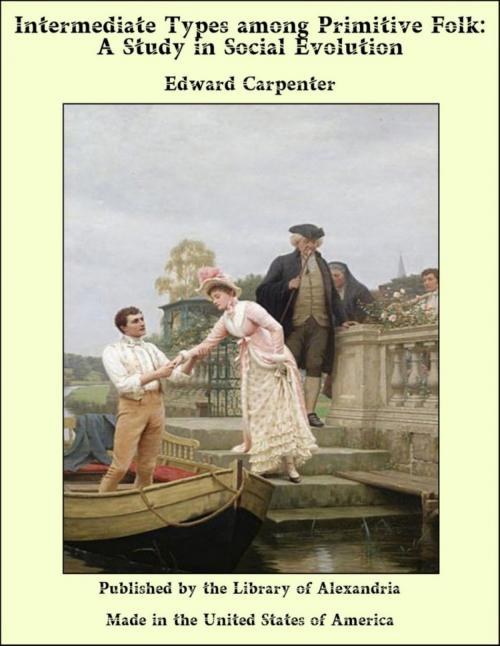Intermediate Types Among Primitive Folk: A Study in Social Evolution
Nonfiction, Religion & Spirituality, New Age, History, Fiction & Literature| Author: | Edward Carpenter | ISBN: | 9781465593061 |
| Publisher: | Library of Alexandria | Publication: | March 8, 2015 |
| Imprint: | Language: | English |
| Author: | Edward Carpenter |
| ISBN: | 9781465593061 |
| Publisher: | Library of Alexandria |
| Publication: | March 8, 2015 |
| Imprint: | |
| Language: | English |
A CURIOUS and interesting subject is the connection of the Uranian temperament with prophetic gifts and divination. It is a subject which, as far as I know, has not been very seriously considered—though it has been touched upon by Elie Reclus, Westermarck, Bastian, Iwan Bloch, and others. The fact is well known, of course, that in the temples and cults of antiquity and of primitive races it has been a widespread practice to educate and cultivate certain youths in an effeminate manner, and that these youths in general become the priests or medicine-men of the tribe; but this fact has hardly been taken seriously, as indicating any necessary connection between the two functions, or any relation in general between homosexuality and psychic powers. Some such relation or connection, however, I think we must admit as being obviously indicated by the following facts; and the admission leads us on to the further enquiry of what the relation may exactly be, and what its rationale and explanation. Among the tribes, for instance, in the neighbourhood of Behring’s Straits—the Kamchadales, the Chukchi, the Aleuts, Inoits, Kadiak islanders, and so forth, homosexuality is common, and its relation to shamanship or priesthood most marked and curious. Westermarck, in his well-known book, The Origin and Development of the Moral Ideas, quoting from Dr. Bogoraz, says:—”It frequently happens that, under the supernatural influence of one of their shamans, or priests, a Chukchi lad at sixteen years of age will suddenly relinquish his sex and imagine himself to be a woman. He adopts a woman’s attire, lets his hair grow, and devotes himself altogether to female occupation. Furthermore, this disclaimer of his sex takes a husband into the yurt (hut) and does all the work which is usually incumbent on the wife, in most unnatural and voluntary subjection… . These abnormal changes of sex imply the most abject immorality in the community, and appear to be strongly encouraged by the shamans, who interpret such cases as an injunction of their individual deity.” Further, Westermarck says “the change of sex was usually accompanied by future shamanship; indeed nearly all the shamans were former delinquents of their sex.” Again he says, “In describing the Koriaks, Krasheninnikoff makes mention of the Ke’yev, that is men occupying the position of concubines, and he compares them with the Kamchadale Koe’kcuc, as he calls them, that is men transformed into women. Every Koe’kcuc, he says, ‘is regarded as a magician and interpreter of dreams… . The Koe’kcuc wore women’s clothes, did women’s work, and were in the position of wives or concubines.’” And (on p. 472) “There is no indication that the North American aborigines attached any opprobrium to men who had intercourse with those members of their own sex who had assumed the. dress and habits of women. In Kadiak such a companion was on the contrary regarded as a great acquisition; and the effeminate men, far from being despised, were held in repute by the people, most of them being wizards.”
A CURIOUS and interesting subject is the connection of the Uranian temperament with prophetic gifts and divination. It is a subject which, as far as I know, has not been very seriously considered—though it has been touched upon by Elie Reclus, Westermarck, Bastian, Iwan Bloch, and others. The fact is well known, of course, that in the temples and cults of antiquity and of primitive races it has been a widespread practice to educate and cultivate certain youths in an effeminate manner, and that these youths in general become the priests or medicine-men of the tribe; but this fact has hardly been taken seriously, as indicating any necessary connection between the two functions, or any relation in general between homosexuality and psychic powers. Some such relation or connection, however, I think we must admit as being obviously indicated by the following facts; and the admission leads us on to the further enquiry of what the relation may exactly be, and what its rationale and explanation. Among the tribes, for instance, in the neighbourhood of Behring’s Straits—the Kamchadales, the Chukchi, the Aleuts, Inoits, Kadiak islanders, and so forth, homosexuality is common, and its relation to shamanship or priesthood most marked and curious. Westermarck, in his well-known book, The Origin and Development of the Moral Ideas, quoting from Dr. Bogoraz, says:—”It frequently happens that, under the supernatural influence of one of their shamans, or priests, a Chukchi lad at sixteen years of age will suddenly relinquish his sex and imagine himself to be a woman. He adopts a woman’s attire, lets his hair grow, and devotes himself altogether to female occupation. Furthermore, this disclaimer of his sex takes a husband into the yurt (hut) and does all the work which is usually incumbent on the wife, in most unnatural and voluntary subjection… . These abnormal changes of sex imply the most abject immorality in the community, and appear to be strongly encouraged by the shamans, who interpret such cases as an injunction of their individual deity.” Further, Westermarck says “the change of sex was usually accompanied by future shamanship; indeed nearly all the shamans were former delinquents of their sex.” Again he says, “In describing the Koriaks, Krasheninnikoff makes mention of the Ke’yev, that is men occupying the position of concubines, and he compares them with the Kamchadale Koe’kcuc, as he calls them, that is men transformed into women. Every Koe’kcuc, he says, ‘is regarded as a magician and interpreter of dreams… . The Koe’kcuc wore women’s clothes, did women’s work, and were in the position of wives or concubines.’” And (on p. 472) “There is no indication that the North American aborigines attached any opprobrium to men who had intercourse with those members of their own sex who had assumed the. dress and habits of women. In Kadiak such a companion was on the contrary regarded as a great acquisition; and the effeminate men, far from being despised, were held in repute by the people, most of them being wizards.”















